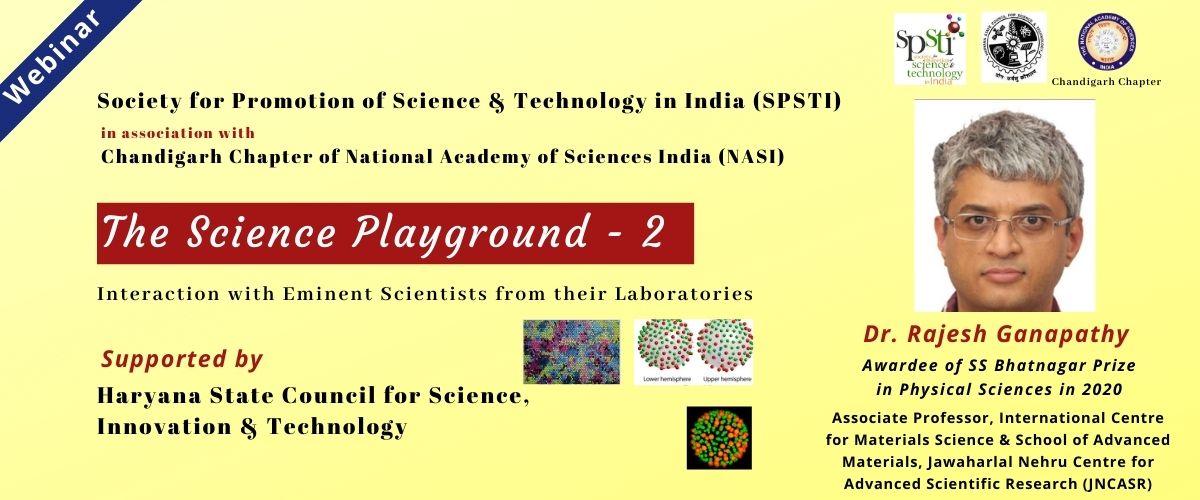A playground is a place to move, explore and enjoy. The laboratory is the scientist’s playground, one which a young student can identify with!
We bring to you this new series called “The Science Playground” in the virtual mode. Lecturing and interacting from their laboratories will be very eminent young scientists of the country. Expository Lectures will be followed by ample time for interaction with the attendees – inquisitive budding scientists.
The series is organized by the Society for Promotion of Science & Technology in India (SPSTI) and the Chandigarh Chapter of National Academy of Sciences, India (NASI), supported by the Haryana State Council for Science, Technology & Innovation, Govt. of Haryana.
The second talk in the series is as follows.
Speaker/ Presenter:
Dr. Rajesh Ganapathy
Awardee, S. S. Bhatnagar Prize in Physical Sciences, 2020
Associate Professor
International Centre for Materials Science & School of Advanced Materials
Jawaharlal Nehru Centre for Advanced Scientific Research (JNCASR)
The lecture was live from Zoom platform with more than 161 attendees on the zoom and more than 912 viewed on the Facebook page of SPSTI from various places all over the country.
The session steered with the introduction by Prof. Keya Dharamvir. The opening remarks were presented by Prof. Arun K. Grover, Former Vice Chancellor of Panjab University and Vice President of SPSTI introduced the speaker Dr. Rajesh Ganapathy. Dr. Ganapathy has advanced the frontiers of our understanding of mechanical response, memory formation, instabilities and arrest in colloidal suspensions, amorphous solids and crystallization of gasses using high precision direct imagining techniques, optical micro-manipulation and sophisticated analysis of colloids, challenging the theoretical framework. The understanding of material’s properties would help developing better materials for domestic and industrial purposes.
In his presentation Dr. Ganapathy used many videos of experiments conducted in his laboratory including experiments conducted by his students. During his session he focused on gaining insights into the physical phenomenon by mimicking them in the laboratory. He shared very simple experiments that can be used to understand the phenomenon in physical sciences. He talked about starling murmuration, army ants death spirals and their movement simulations in the lab using three Reynolds rule. Colloidal particles to understand the atomic system. He explained about epitaxy, a method of deposition of microcrystalline film on a monocrystalline substrate and how these are an important part of semiconductor chips being widely used in computers and smartphones. He also talked about the process of devitrification which is the process of conversion of glass to crystal and how avoiding this process is important in the pharmaceutical industry. He shared the experiment where machine learning was used to predict devitrification. He talked about the distortion that occurs when a surface is curved during crystallization. The simple experiment of a hair dryer and ping pong ball to explain how the colloids can be manipulated using the laser beam. He shared colloids and granules are excellent model systems to gain insights into physical processes. They are a powerful complementary approach to numerical simulations.
The lecture was appreciated by an audience of educationists, scientists, students, and teachers. Questions and discussions included the application of these experiments in real life. Large number of students and researchers attended and interacted with the speaker, his students and his mentor and collaborator Prof. Ajay Kumar Sood, FRS, former President of INSA and IASc and Honorary Professor, IISc., Bangalore.
Shri Dharam Vir, IAS (Retd.) & President SPSTI, presented a vote of thanks to the speaker as well as the audience. He also announced more lectures would be organized under the Playground series. Prof. Sood complimented the SPSTI for the conception and implementation of this series and desired that though pandemic has nucleated it, however, it ought to be continued beyond pandemic times.

